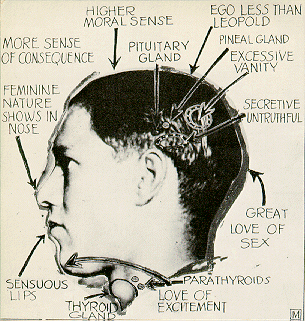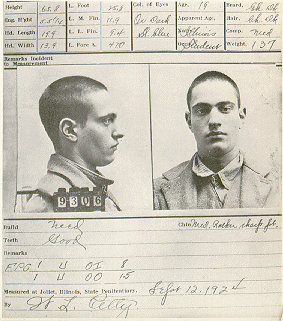
"An intellectual machine going without balance" is how Clarence Darrow described Nathan Leopold in his trial summation. Leopold was a boy of supernormal intelligence, busy every minute of his life, who nonetheless was "void of the healthy instincts of practical life." As a teen, Leopold became obsessed with the philosophy of Friedrich Nietzsche. Nietzsche's philosophy became his life and destroyed his life.
Nathan Leopold was the son of a millionaire box manufacturer who indulged Nathan's most every whim after his mother died when he was young. Unlike the handsome, athletic Loeb, Leopold was undersized, with rather bulging eyes. By many accounts, he was sensitive about his appearance. He threw himself into intellectual pursuits where he met with remarkable success. By 18, he had mastered nine or ten languages, was an advanced botanist, a nationally recognized authority on birds, and a scholar of the classics and philosophy. Clarence Darrow was to write of Leopold in his 1932 autobiography that "He had, and has, the most brilliant intellect that I ever met in a boy.... He was often invited to lecture before clubs and other assemblages; he was genial, kindly, and likeable. Everyone prophesied an uncommon career for the lad." Not everyone, however, agreed with Darrow's characterization of Leopold as likeable. Others found him to be arrogant and contemptuous.
In 1924, Leopold was looking forward to a family trip to Europe, then beginning studies at the Harvard Law School in September. Meanwhile, he was teaching four birding classes, dating his girlfriend, Susan Lurrie, and continuing a bizarre relationship with his friend Richard Loeb.
The relationship between the two was intense. It included sex. According to a prosecution psychiatrist, "Leopold acquiesced in Loeb's criminalistic endeavors and received in return opportunities for certain twisted biological satisfactions." Leopold said of Loeb that he was "jealous of the food he ate and the water he drank" because these "became part of his being." The boys quarreled often. Leopold was apparently irked by Loeb's mental inferiority and immaturity. The strange nature of their relationship is revealed in a lengthy October, 1923 letter to Loeb in which Leopold wrote, "When you came to my home this afternoon I expected either to break friendship with you or attempt to kill you unless you told me why you acted as you did yesterday." According to one psychiatrist who examined the boys, the two had a "king-slave relationship" in which Leopold played the slave to King Loeb. Other evidence, however, tends to suggest the relationship was far more complicated than that description suggests.
Leopold tried, without complete success, to stifle common emotions and live the unscrupled life of Nietzsche's superman. He was an atheist who felt unbound by any moral code. Although Leopold "had not," according to Darrow, "the slightest instinct toward what we are pleased to call crime," his desire to please Loeb led him to join in petty thefts, vandalism, and finally murder. Leopold mug shot
After his conviction, Leopold was a remorseful prisoner. He continued his obsession with learning, eventually mastering 28 languages. He taught other prisoners, volunteered for malaria testing, reformed the Joliet prison's library and educational system, and worked in the prison hospital.
Following his release from prison in 1958, Leopold migrated to Puerto Rico where he studied birds, taught mathematics at the University of Puerto Rico, and worked as an x-ray technician in a hospital operated by The Church of the Brethren. His constant movement from job to job suggest his tendency to easily become bored. He commented that "Helping others has become my chief hobby--it's how I get my kicks." In 1961, he married a widow who was working in a flower shop in San Juan. Five years out of prison, Leopold concluded that his time spent in prison had come to be worth the joy of his freedom: "I came to the conclusion that on September 15, 1963, I reached the point where it all became worthwhile: that the joy of being a free man again equalled the grief of those thirrty-three years." Hal Higdon, author of a book on the Leopold-Loeb trial, saw Leopold in his last years as nostalgic, wanting to be loved, "wanting to be seen as human."
In 1971, Leopold died of heart trouble brought on by his diabetes. He willed his body to the University of Puerto Rico for medical research. One cannot read the story of Nathan Leopold's life without a mixture of sadness for his great tragedy, caused as it was by an uncommon young love, and admiration for fifty years worth of effort devoted to expiation for his crime. Neither can one know the story of Nathan Leopold and still believe that the public, in its loud demands for his hanging in 1924, had God on their side.

